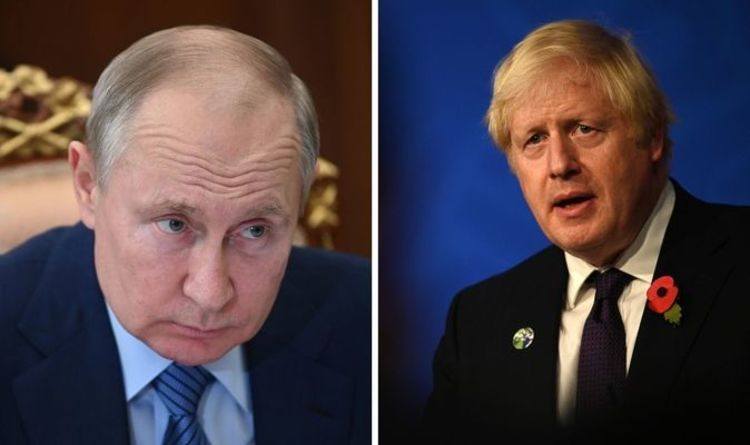Belarus-Poland: Putin wants to ‘test EU response’ says professor
We use your sign-up to provide content in ways you’ve consented to and to improve our understanding of you. This may include adverts from us and 3rd parties based on our understanding. You can unsubscribe at any time. More info
Last week tensions rose on the border between Poland and Russia’s ally Belarus over refugees stranded in camps. In turn, UK Foreign Secretary Liz Truss urged Mr Putin to intervene in the “shameful manufactured migrant crisis” that was unfolding. She insisted the UK would “not look away” and that Putin had a “clear responsibility” to intervene.
Meanwhile, a build-up of Russian troops on the border of Ukraine has sparked concerns among Western allies about the potential of military attack.
The West’s unpredictable relationship with Russia led General Carter to claim that Russia was a greater threat to Eastern Europe than when he took on his role of Chief of the Defence eight years ago.
General Carter said in a series of interviews over the weekend that he hopes there would be no war with Russia, but Nato would need to be ready.
Of course, tensions between the West and Russia have existed throughout General Carter’s spell as Army chief.
Read More:EU row explodes as Macron sent stark warning over ‘risky’ plan


Last December, after ten Russian warships entered British waters, he claimed that Russia was “flexing its muscles” in a way not seen since the Cold War.
He said that Moscow was testing the UK and the Nato allies, while also reacting to problems with its neighbours.
Speaking at the Royal United Services Institute Christmas lecture, General Carter said: “They are wrestling with their own sense of imperial overstretch and their ‘near abroad’ becomes increasingly restive.
“The week before last, Russia assembled 10 or so warships and combat aircraft from the northern Baltic and Black Sea fleets in a show of force in the waters of the British and Irish coasts.

“They are flexing their muscles in our backyard with an ostentation that they’ve not displayed since the Cold War.
“Deterring these threats, signalling to the Russian regime that we shall not tamely acquiesce should they escalate, requires conventional hard power, warships and aircrafts, as well as less conventional capabilities like cyber.”
General Carter, who served in Afghanistan, Iraq and Bosnia, also said the UK needed to maintain strong relations with allies, such as Nato.
Departing from his role as Chief of Defence at the end of the month, General Carter gave a series of interviews at the weekend in which he claimed the military needed to be ready for war with Russia.
Don’t Miss:
Macron rival Eric Zemmour branded ‘damage to peace’ in France[ANALYSIS]
Macron rival Eric Zemmour blasted ‘unbearable domination’ of English[OPINION]
Macron’s been given ‘gift’ of EU influence before French election[INSIGHT]

He did however insist he“distinctly hoped” there would not be conflict and that he did not believe Putin wants a “hot war” with the West.
Speaking on Sky News on Sunday, General Carter said: “Russia probably regards the global strategic context as a continuous struggle in which, I think, they would apply all the instruments of national power to achieve their objectives.
“But in so doing [the Russians] don’t want to bring on a hot war.
“The question is, of course, how you define war and I, as a soldier, would tend to define war as the actual act of combat and fighting, and I don’t think they want that.

“I think they want to achieve their objective in rather more nuanced ways.”
General Carter later featured on The Andrew Marr Show, where he said Russia was in a “hybrid playbook where you link disinformation to destabilisation and the idea of pushing migrants on the European Union’s borders is a classic example of that sort of thing.”
He added that he believed the situations at Belarus and Ukraine’s respective borders were “classic distraction” by the Russian government, variants of which had been going on “for years and years and years.”
Asked whether it could turn into a “hot war”, General Carter said: “I don’t know.
“I think we have to be on our guard and make sure the deterrence prevails and critically we have to make sure there is unity in the Nato alliance.
“We don’t want any gaps to occur in our collective position.”
Source: Read Full Article





